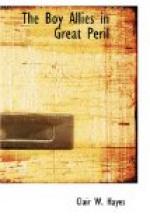The latter swung himself about suddenly and with a sweep of his arm sent the man’s revolver clattering to the ground. The other uttered an exclamation of rage, and stepped back.
Chester again reached for his own revolver, but once more the other was too quick for him. He came forward with a jump, and his right fist shot out. Chester ducked this blow, but he was unprepared for the left-handed blow that followed.
As he came up after ducking the first blow, the second caught him squarely upon the point of the chin, and he toppled over. It was a clean knockout.
“I guess that will settle you,” said the victor, as he surveyed the prostrate forms of his two enemies. “I guess that will teach you not to interfere in other people’s business. Hello, one of them is moving.”
He gazed curiously at Hal, who at that moment opened his eyes. The man stood undecided a moment. Then he took a step toward the boy, but stopped again.
“No,” he muttered. “What’s the use? Let him be.”
He swung upon his heel and made his way down the street. A moment later he was lost to sight around a corner.
CHAPTER II.
The two friends.
While Hal and Chester are still upon the ground and consciousness is gradually returning, it will be well to introduce a few words concerning them, that those who have not made their acquaintance before may learn just what sort of boys our heroes are.
Hal Paine and Chester Crawford were typical American boys. With the former’s mother, they had been in Berlin when the great European conflagration broke out and had been stranded there. Mrs. Paine had been able to get out of the country, but Hal and Chester were left behind.
In company with Major Raoul Derevaux, a Frenchman, and Captain Harry Anderson, an Englishman, they finally made their way into Belgium, where they arrived in time to take part in the heroic defense of Liége in the early stages of the war. Here they rendered such invaluable service to the Belgian commander that they were commissioned lieutenants in the little army of King Albert.
Both in fighting and in scouting they had proven their worth. Following the first Belgian campaign, the two lads had seen service with the British troops on the continent, where they were attached to the staff of General Sir John French, in command of the English forces. Also they had won the respect and admiration of General Joffre, the French commander-in-chief.
As related in the third book of this series, “The Boy Allies with the Cossacks,” Hal and Chester had seen active service under the Russian Bear in the eastern theater of war. They fought in the midst of the Russian forces and were among the troop of 60,000 that made the first wild dash over the Carpathians to the plains of Hungary.
Returning to the western war area with despatches from the Grand Duke Nicholas to the French commander-in-chief, they had again taken up their duties with the British army. As related in “The Boy Allies in the Trenches,” they had been instrumental in defeating more than one German coup, and it was through them, also, that a plot to assassinate President Poincaré had failed.




